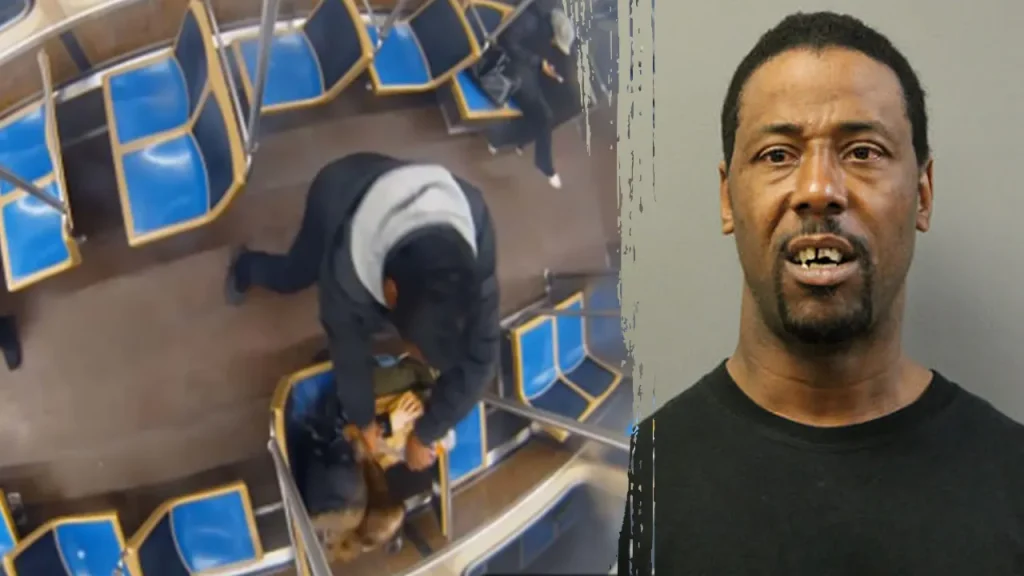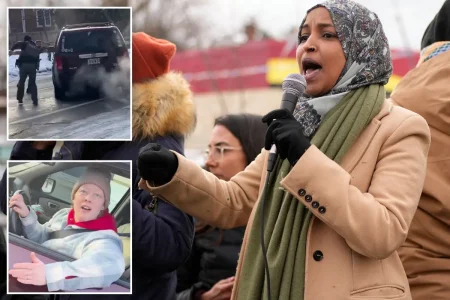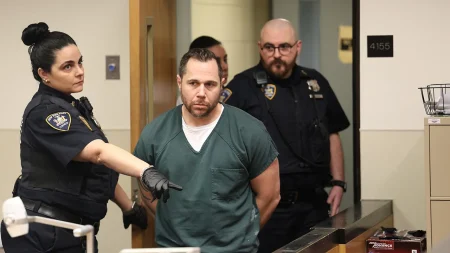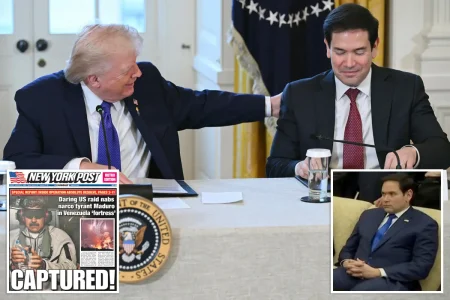Chicago Transit Terror: Shocking Attack Highlights Concerns Over Repeat Offenders and Public Safety
In a disturbing incident that has reignited debate about public transit safety and criminal justice policies, 50-year-old Lawrence Reed faces federal terrorism charges after allegedly setting a woman on fire on a Chicago Blue Line train. According to the Northern District of Illinois U.S. Attorney’s Office, Reed approached a 26-year-old woman from behind on Monday evening, doused her with gasoline from a plastic bottle, and set her ablaze. Surveillance footage shows Reed chasing the victim through the train car before igniting her, then watching as she was “engulfed in flames.” The woman, who suffered severe burns to her head and body, managed to exit the train at the next stop before collapsing. She was rushed to a hospital in critical condition while Reed fled the scene, only to be apprehended the following morning with visible burn marks on his hand and wearing clothing that matched the suspect’s description.
Reed’s arrest has drawn attention to his extensive criminal history, which includes at least 13 prior arrests for offenses ranging from battery to arson. Most notably, he faced felony aggravated arson charges for allegedly starting a fire at the Thompson Center during a COVID-19 briefing by Governor JB Pritzker. Reed’s record also includes multiple instances of seemingly random attacks on women, including February 2020 incidents where he allegedly punched women in the face and slapped a man at a CTA Blue Line platform. Despite these charges, Reed was repeatedly released on recognizance bonds. As recently as August, after allegedly assaulting a woman at a psychiatric hospital, prosecutors requested Reed remain in custody, but he was instead released with an ankle monitor. This pattern of release despite violent behavior has prompted criticism of Chicago’s approach to repeat offenders.
The federal terrorism charge against Reed—specifically “committing a terrorist attack or other violence against a mass transportation system”—is relatively uncommon but appropriate given the circumstances, according to retired NYPD inspector Paul Mauro. During his court appearance, Reed displayed erratic behavior, repeatedly interrupting the judge, declaring “I plead guilty,” and at one point claiming to be a Chinese citizen. While this behavior might suggest a potential insanity defense, Mauro noted that the burden of proving mental incompetency falls entirely on the defendant. U.S. Attorney Andrew Boutros stated he had not been made aware of Reed ever being legally declared mentally incompetent. If convicted, Reed faces the possibility of life imprisonment, and prosecutors noted that should the victim die from her injuries, the case could potentially become eligible for the death penalty.
Federal authorities have expressed frustration that Reed was free despite his violent history. ATF Special Agent-in-Charge Christopher Amon bluntly stated, “Lawrence Reed had no business being on the streets given his violent criminal history and his pending criminal cases. Reed had plenty of second chances by the criminal justice system, and, as a result, you have an innocent victim in the hospital fighting for her life.” This sentiment underscores growing concerns about public safety in relation to lenient bail policies, particularly in major cities. Mauro suggested the federal charges might be sending a message that federal authorities “don’t trust the local prosecutor,” adding, “We’re taking this and charging it because you guys had 13 shots at this guy, and you didn’t get it done.”
Chicago Mayor Brandon Johnson, while condemning the attack, characterized it as an “isolated incident,” stating, “This is obviously a tragedy, and it’s the tragedy of one of the worst of its kind. And we’re hoping, of course, that everyone can heal in this moment.” However, the case has intensified debate about broader issues of public safety on mass transit systems across the country. Similar incidents have occurred in other cities, contributing to a perception that commuters face increasing danger when using public transportation. Critics argue that policies allowing repeat offenders to remain free despite multiple arrests create unnecessary public safety risks. As Mauro put it, “It just means that every time you get on the subway or even walk the streets, it’s Russian roulette. And if it’s your bad luck that day, you’re going to find out why these policies are so detrimental.”
The Chicago transit attack represents a particularly horrific example of violence in public spaces, but it also highlights systemic issues that extend beyond a single incident. The case raises difficult questions about the balance between criminal justice reform, public safety, mental health intervention, and accountability. For many observers, Reed’s extensive prior record and the severity of this attack suggest failures at multiple levels of the system—from initial interventions to prosecution decisions to supervision of known violent offenders. As the case proceeds through federal courts rather than Chicago’s local justice system, it may serve as a flashpoint in ongoing national debates about crime policies, particularly regarding how to address individuals with patterns of violent behavior while still pursuing broader criminal justice reforms that aim to reduce unnecessary incarceration.











